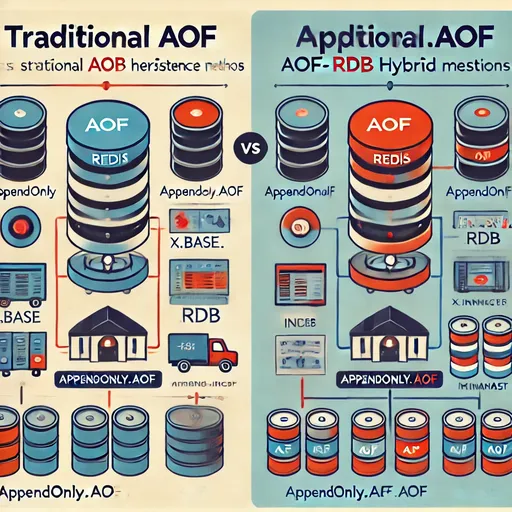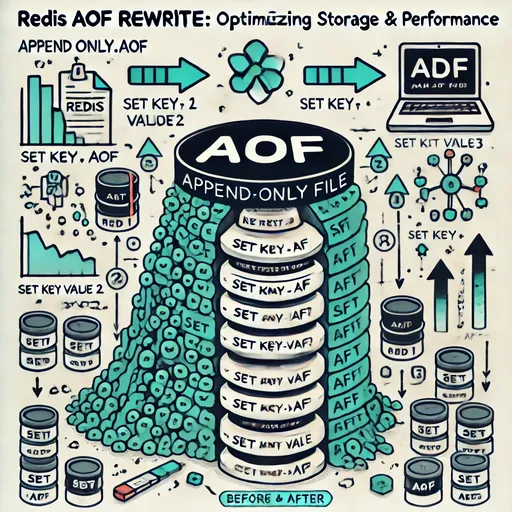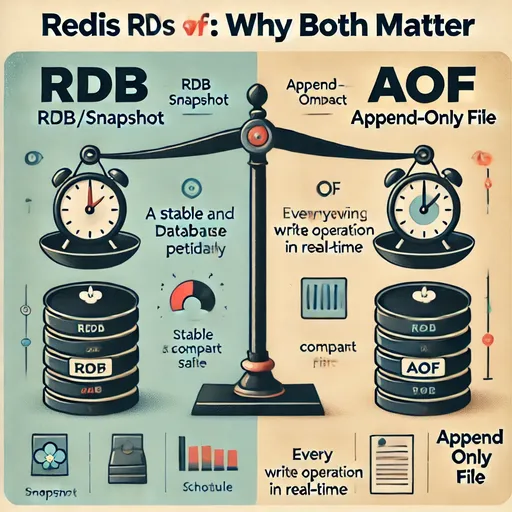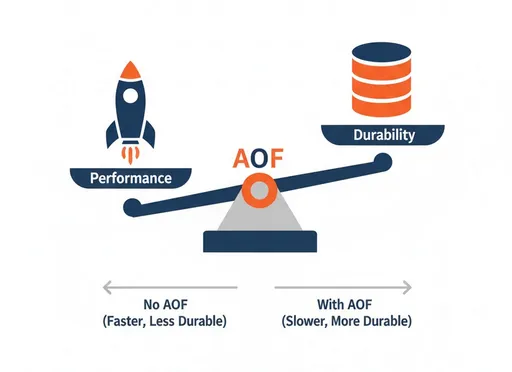1. Differences Between Traditional AOF and AOF-RDB Hybrid Method
AOF (Append-Only File) is one of the persistence methods of Redis, which records data changes to a file for the purpose of data recovery in case of failures.
👉 For a detailed explanation of AOF concepts, it is recommended to check the previous post
Redis AOF Rewrite: Performance Optimization and Data Preservation first.
This article focuses on analyzing the differences between the traditional AOF method and the AOF-RDB Hybrid method introduced in Redis 7.0 and above.
2. Redis 7.0 and Above: Introduction of AOF-RDB Hybrid Method
To address the inefficient disk usage and slow recovery speed issues of the traditional AOF method, Redis 7.0 and above has adopted the AOF-RDB Hybrid method as the default.
This method combines RDB snapshots with AOF to store data in a more optimized way.
✅ How AOF-RDB Hybrid Method Works
- Storing the initial state → When Redis saves AOF, it first creates an RDB snapshot and stores it in the
appendonly.aof.X.base.rdbfile. - Subsequent changes are stored → All subsequent changes are recorded in the
appendonly.aof.X.incr.aoffile. - During data recovery → When Redis restarts, it first loads the RDB and then reflects the AOF delta to restore to the latest state.
3. File Structure of AOF-RDB Hybrid Method
📌 Unlike the previous single file method appendonly.aof, Redis 7.0 creates the following files.
sudo ls -l /var/lib/redis/appendonlydir
-rw-rw---- 1 redis redis 1146587 Feb 19 12:37 appendonly.aof.2.base.rdb # RDB snapshot file
-rw-r----- 1 redis redis 41279742 Feb 19 20:05 appendonly.aof.2.incr.aof # AOF delta file (subsequent changes saved)
-rw-r----- 1 redis redis 88 Feb 19 12:37 appendonly.aof.manifest # AOF-related metadata management file
appendonly.aof.X.base.rdb→ A RDB snapshot file storing the current Redis memory stateappendonly.aof.X.incr.aof→ An AOF file recording subsequent changesappendonly.aof.manifest→ A metadata file managing the list of AOF files

🚀 Conclusion: Since AOF-RDB Hybrid method is the default setting in Redis 7.0 and above, a single appendonly.aof file is not created.
4. Comparison Between Traditional AOF and AOF-RDB Hybrid Method
| Comparison Item | Traditional AOF (appendonly.aof) | AOF-RDB Hybrid (appendonly.aof.X.base.rdb) |
|---|---|---|
| File Structure | Single appendonly.aof file | RDB + AOF Hybrid structure |
| Recording Method | Stores all commands sequentially | RDB snapshot + AOF delta storage |
| Performance | Slows down over time | Faster and optimized |
| Recovery Speed on Redis Restart | Slow (executes all commands) | Fast (loads RDB first, then reflects AOF) |
| Storage Space | Size continuously increases | Optimized based on RDB |
| Disk I/O Burden | Increases due to storing all commands | Decreased due to RDB basis |
📌 Conclusion:
- The traditional AOF method has high data reliability, but issues with performance and disk usage.
- The AOF-RDB Hybrid method offers advantages like fast recovery, efficient storage usage, and lower disk I/O burden.
- The AOF-RDB Hybrid method is recommended in most operational environments. 🚀
5. Is RDB Configuration Required When Using AOF-RDB Hybrid Method?
👉 Yes, RDB-related settings are necessary!
Since the AOF-RDB Hybrid method is based on RDB, the redis.conf file must have correctly applied RDB-related settings.
✅ Settings to Check for AOF-RDB Hybrid Method
appendonly yes # Enable AOF
aof-use-rdb-preamble yes # Use AOF-RDB Hybrid method (default)
save 900 1 300 10 60 10000 # RDB snapshot creation intervals
🚨 If there are no RDB settings, the AOF-RDB Hybrid method may not work properly!
Setting aof-use-rdb-preamble to no will revert to the previous aof single file method.
6. Conclusion: How to Choose Redis AOF Method in Practice
- In Redis 7.0 and above, AOF-RDB Hybrid method is recommended by default
- It offers advantages including faster recovery speed, reduced storage space usage, and lower disk I/O burden compared to traditional AOF
- The hybrid method may not function correctly without RDB settings applied
- In cases requiring extreme data reliability, like finance or transaction systems, the traditional AOF method may be advantageous
🚀 In most operational environments, the AOF-RDB Hybrid method is significantly more efficient than the traditional AOF method and is recommended for use.





There are no comments.